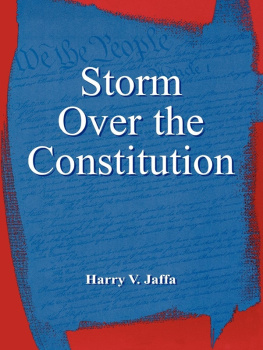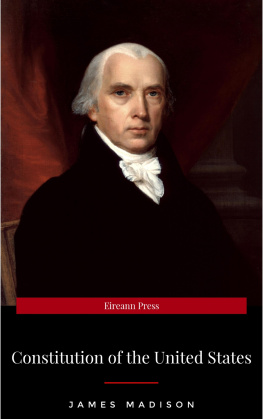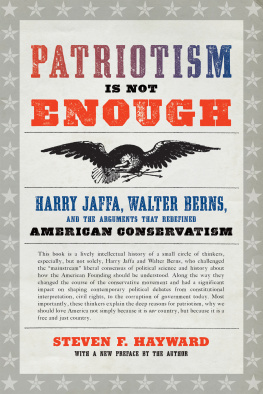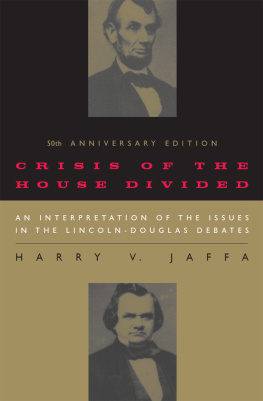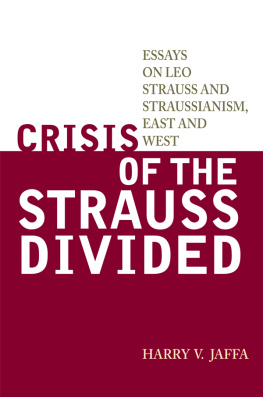Jaffa - Storm Over the Constitution
Here you can read online Jaffa - Storm Over the Constitution full text of the book (entire story) in english for free. Download pdf and epub, get meaning, cover and reviews about this ebook. year: 2013, publisher: Lexington Books, genre: Romance novel. Description of the work, (preface) as well as reviews are available. Best literature library LitArk.com created for fans of good reading and offers a wide selection of genres:
Romance novel
Science fiction
Adventure
Detective
Science
History
Home and family
Prose
Art
Politics
Computer
Non-fiction
Religion
Business
Children
Humor
Choose a favorite category and find really read worthwhile books. Enjoy immersion in the world of imagination, feel the emotions of the characters or learn something new for yourself, make an fascinating discovery.
- Book:Storm Over the Constitution
- Author:
- Publisher:Lexington Books
- Genre:
- Year:2013
- Rating:3 / 5
- Favourites:Add to favourites
- Your mark:
- 60
- 1
- 2
- 3
- 4
- 5
Storm Over the Constitution: summary, description and annotation
We offer to read an annotation, description, summary or preface (depends on what the author of the book "Storm Over the Constitution" wrote himself). If you haven't found the necessary information about the book — write in the comments, we will try to find it.
Jaffa: author's other books
Who wrote Storm Over the Constitution? Find out the surname, the name of the author of the book and a list of all author's works by series.
Storm Over the Constitution — read online for free the complete book (whole text) full work
Below is the text of the book, divided by pages. System saving the place of the last page read, allows you to conveniently read the book "Storm Over the Constitution" online for free, without having to search again every time where you left off. Put a bookmark, and you can go to the page where you finished reading at any time.
Font size:
Interval:
Bookmark:
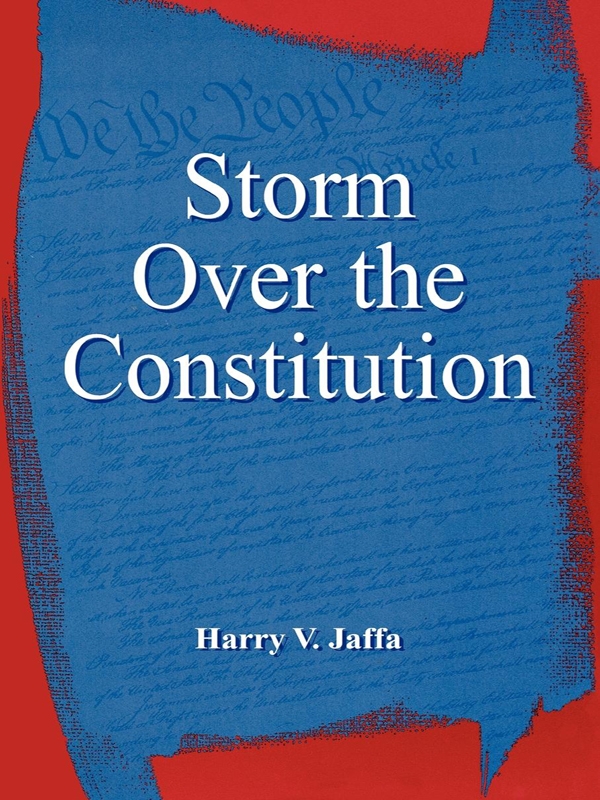
The introduction was originally published as Natural Right in the American Founding, Review Essay on Original Intent and the Framers of the Constitution: A Disputed Question, by Harry V. Jaffa, Vol. 23, No. 3 (Spring, 1996), INTERPRETATION: A JOURNAL OF POLITICAL PHILOSOPHY, pp. 457-475. The Closing of the Conservative Mind, Whatever Happened to the Emperors New Clothes?, Natural Law, the Constitution, and Robert Bork, The Inkblot Constitution, and Is the Constitution Good? were originally published in Storm Over the Constitution: Jaffa Answers Bork (Claremont: The Claremont Institute, 1994). Lino Graglia, Jaffas Quarrel with Bork, was originally published in Vol. 4, No. 3 (Summer, 1995), THE SOUTHERN CALIFORNIA INTERDISCIPLINARY LAW JOURNAL, pp. 705-713; Jaffa, Graglias Quarrel with God was published in the same issue at pp. 715-738. Charles Cooper, Harry Jaffas Bad Originalism originally appeared in 1994 PUBLIC INTEREST LAW REVIEW, pp. 189-215. Jaffas Slaying the Dragon of Bad Originalism appeared in a shorter version in 1995 PUBLIC INTEREST LAW REVIEW, pp. 209-219. All articles are reprinted with permission.
Established in 1978, The Claremont Institute sponsors research, writing, teaching, and discussion to illuminate the principles and promote the practice of free government. In addition to the Center for the Study of the Natural Law, it incorporates the Center for the American Constitution, the Golden State Center for Policy Studies, and the Asian Studies Center.
Harry V. Jaffa is Professor Emeritus of Political Philosophy at Claremont McKenna College and a Distinguished Fellow at The Claremont Institute. Among his many books are Crisis of the House Divided: An Interpretation of the Lincoln-Douglas Debates; How to Think about the American Revolution; The Conditions of Freedom; and Original Intent and the Framers of the Constitution: A Disputed Question.
Professor Lino A. Graglia is A. Dalton Cross Professor of Law at the University of Texas Law School. He has written widely in constitutional lawespecially on judicial review, constitutional interpretation, race discrimination, and affirmative actionand also teaches and writes in the area of antitrust. He is the author of Disaster by Decree: The Supreme Court Decision on Race and the Schools (Cornell, 1976) as well as many articles.
Charles Cooper is a partner in the Washington, D.C., law firm of Cooper Carvin & Rosenthal, PLLC. From 1985 to 1988, Mr. Cooper served as the Assistant Attorney General for the Office of Legal Counsel in the United States Department of Justice. He has spoken and written extensively on the subject of constitutional interpretation.
The Claremont Institute
250 West First Street, Suite 330
Claremont, California 91711
Telephone (909) 621-6825
Fax (909) 626-6724
www.claremont.org www.founding.com
Lino A. Graglia
Harry Jaffa has long engaged in a campaign of vilification against Robert Bork and Chief Justice William Rehnquist, a campaign I consider both sad and shabby. It is sad because he is attacking people who are on my and, he says, his side of the basic issue of constitutional lawthe issue of the proper role of the Supreme Court in our system of government. One must expect attacks on Bork and Rehnquist from Ronald Dworkin, Bruce Ackerman, and Larry Tribe, and one can derive satisfaction from refuting them. But Jaffa is a hard-core political conservative; he was an advisor to Senator Barry Goldwater at a time when the name Goldwater was a liberal epithet. Indeed, he claims to be responsible for the famous slogan about extremism in defense of liberty being no vice, a stroke of genius that surely cost Goldwater whatever slim chance he ever had of winning the election. More important for present purposes, he is also, he tells us, a judicial conservative, a staunch foe of the judicial activism of the last forty years that has served to make the Supreme Court the enacting arm of the ACLUs political agenda. There is no pleasure for me in disagreeing with a man who opposes government by judges.
But if Jaffa is opposed to judicial activism, why does he devote his time and energy to reviling its two most prominent and effective opponents in the past half-centuryjoined now by justices Scalia and Thomasexcepting possibly only Learned Hand? How is the public interest served by that? And reviled them he has. His campaign against them has been shabby because he has attacked them not as a friendly critic or a disinterested scholar, but personally, bitterly, and arrogantly. Jaffa tells us that Bork no doubt in his own mind... has taken on something of the status of a martyred saint of conservatism, a statement for which he has not the slightest basis.
Senator Hatchs support of Bork, Jaffa says, has the tone of triumphant martyrology. Surely hyperbole can go no further, he sneers, than for Senator Hatch to compare Borks prose to Churchills, something that Senator Hatch has not done. Judge Borks critics, Jaffa tells us, had reason to persuade the public that he really has no principles. Bork, Jaffa says, engages in the most shameless expurgating and bowdlerizing of the Constitutions text and his mental confusion... is boundless. Jaffa substitutes arrogance for argument, as when he says It is embarrassing to have to instruct Judge Bork in... the simplest elements of the political philosophy of the American Founding. Chief Justice Rehnquist is not the subject of these pieces, but Jaffa cannot resist a passing contemptuous reference to him as that fountain of authority.
What sins can Bork and Rehnquist have possibly committed in Jaffas eyes to deserve such contempt? Which of Borks many decisions as a court of appeals judge or of Rehnquists many more on the Supreme Court does Jaffa consider acts of judicial misbehavior or does he even disagree with? As far as I can tell, there are none. I could fault Bork and Rehnquistas well as Scalia, Thomas, and even Handas rather too activist for my taste, too ready to hold laws unconstitutional, but that is not Jaffas complaint. How, then, have Bork and Rehnquist offended him? It happens that Harry Jaffas principal contribution to constitutional scholarship and political theory is his peculiar notion, following Abraham Lincoln, that the Constitution incorporates the Declaration of Independence. He considers this the most crucial and incisive insight in the history of American constitutional theory and political science, and he is enraged that Bork and Rehnquist have failed to appreciate his insight.
Jaffa agrees with Bork. He says, that,
the notion that the justices of the Supreme Court may in any way alter or amend the law of the Constitution by importing into it ideas or principles drawn from outside the Constitution itself is utterly abhorrent to sound jurisprudence. Like Judge Bork, I am devoted to the principle that the justices of the Su-preme Court are bound unqualifiedly by the positive law of the Constitution, and that the positive law of the Constitution is to be understood in terms of the original intent of those who framed it and those who ratified it.
Jaffa is as opposed as Bork, he claims, to liberal judicial activism, and differs from Bork only in his answer to the question, What was the original intent of those who framed and those who ratified the Constitution? What Bork fails to understand, according to Jaffa, is that natural law principles are present within the Constitution, as elements of the positive law of the Constitution. Thus, Jaffa is able to insist that he is, like Bork, a positivista proponent of the view that the only function of judges is to enforce enacted lawdespite also being a believer in natural law. In fact, however, he is chasing an oxymoron, positive natural law or natural law positivism.
Font size:
Interval:
Bookmark:
Similar books «Storm Over the Constitution»
Look at similar books to Storm Over the Constitution. We have selected literature similar in name and meaning in the hope of providing readers with more options to find new, interesting, not yet read works.
Discussion, reviews of the book Storm Over the Constitution and just readers' own opinions. Leave your comments, write what you think about the work, its meaning or the main characters. Specify what exactly you liked and what you didn't like, and why you think so.

